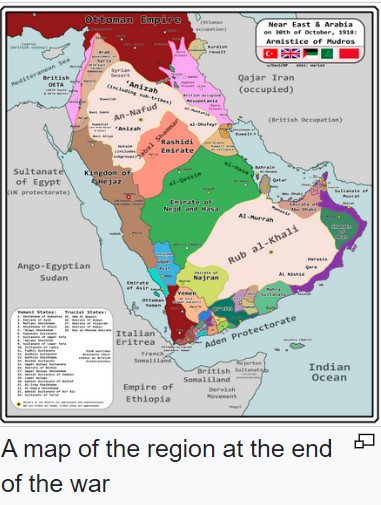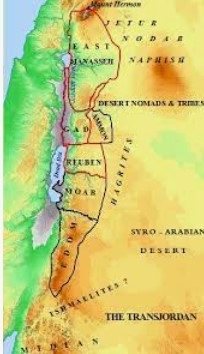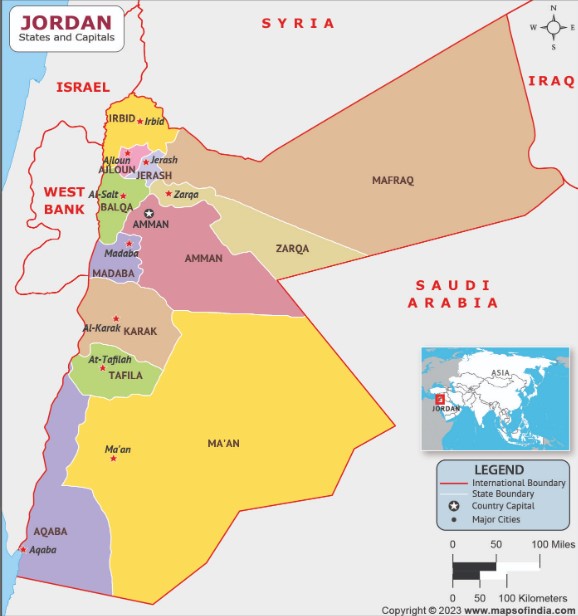How the modern State of "Jordan" and the Middle East came into being.




The Hashemite family had ruled the city of Mecca in Hejaz, Arabia from 900s CE. The whole region eventually came under the rulership of the Ottoman Turks.
The Ottoman Turks at first allowed much local autonomy and invovled subject peoples in their rulership. After 1889 they began to lay more emphasis on Turkey as an Ethnic Concept. beibng "Turkish" was important. Many of their subject peoples resented this.
The Ottoman Turks in 1908 had recognized Sharif Hussein ibn Ali,as Sharif and Emir of Mecca. The Sharif was charged with protecting the cities of Mecca and Medina and their environs and ensuring the safety of pilgrims performing the Hajj. The Hajj is the annual Muslim Pilgrimage to Mecca.
In 1916 Sharif Hussein rebelled against the Ottomans and began the so-called "Great Arab Revolt."
The primary goal was to establish an independent and unified Arab state stretching from Aleppo to Aden. The British government allegedly had agreed to this.
Hussein and the Hashemites accompanied by T. E. Lawrence (aka "Lawrence of Arabia") of Arabia with backing from the British military's Egyptian Expeditionary Force, successfully fought and expelled the Ottoman military presence from much of the Hejaz and Transjordan. In 1918, the rebels occupied Damascus which had actually been captured by the Australian contingent in the British Army and NOT by the Arabs as is usually claimed.
The Arabs then proclaimed the Arab Kingdom of Syria, a short-lived monarchy that was led by Hussein's son Faisal.
The British were already obligated to the French by the Sykes-Picot Agreement.
In the Franco-Syrian War of 1920 the French defeated King Feisal son of Hussein. The region of Syria was eventually divided into several client states under the Mandate for Syria and the Lebanon. The British government declared the fugitive Faisal, who had been deposed in Syria, as the new king of Iraq.
At that time Transjordan was officially under British Rule but there were hardly any Britishers there. The region was loosely controlled by a few Beduin Tribes. Abdullah a son of Hussein with a band of his followers invaded the area in 1921 and declared himself king persuading the Bedouin chieftains to recognize him. .
The British felt that they had some kind of debt to the family of Hussein, so rather than forcibly eject him, recognized his claim. On May 15, 1923, Britain formally recognized the Emirate of Transjordan as a state under the leadership of Emir Abdullah.
Abdullah accepted British tutelage. The British strengthened his rule against local rebellions and raiders from Arabia.
He was an inveterate trouble-maker.
Feisal claimed to be the legitimate ruler of Syria and Palestine. In the early days of the Mandate Feisa was considered by many of the Arabs to be the dominant champion of the anti-Jewish anti-British forces in Palestine.
His family were the Hashemites, Since the 600s CE shortly after the death of Mohamed, they had been the hereditary rulers (Sharifs) of Mecca, traditional steward of the Islamic holy cities of Mecca and Medina.
Sharif Hussein bin Ali, who ruled from 1908, allied with the British in World War 1 and rebelled against Ottoman Turkish rule rule during the Arab Revolt of 1916.
After their defeat of the Turks in 1918, Hussein in 1923, formed the independent Kingdom of Hejaz and then declared himself Caliph, i.e. ruler of all Muslims.
Meanwhile the family of Ibn Saud had been expanding their control over Central Arabia.
In 1924 Ibn Saud conquered the area of Mecca and Medina (the Hejaz) and expelled the Hashemites. The House of Saud has ruled Mecca and Medina ever since.
McMahon�Hussein correspondence
The McMahon�Hussein correspondence is a series of letters that were exchanged during World War I, in which the government of the United Kingdom agreed to recognize Arab independence in a large region after the war in exchange for the Sharif of Mecca launching the Arab Revolt against the Ottoman Empire..
The area of Arab independence was defined to be "in the limits and boundaries proposed by the Sherif of Mecca" with the exception of "portions of Syria" lying to the west of "the districts of Damascus, Homs, Hama and Aleppo";
This as the British would later affirm should have EXCLUDED the areas of Palestine, as well as Lebanon much of Syria and even Jordan.
The Arabs headed by the Hussein family would however claim that it included all of these.
They were to say that the Sykes-Picot agreement followed by the Balfour Declaration were a betrayal of pledges given them. The Sykes-Picot agreements had allocated western areas (including in effect Palestine) of the Turkish Empire to the British as spheres of influence. Lebanon and Syria went to the French.
The Balfour Declaration potentially gave the Jews a state in Palestine. Hussein and the Arabs had actually done very little.
The Arab Revolt had been romanticized by Lawrence of Arabia and had propaganda value but it did not really do much. Australian troops conquered Damascus with the Arabs of Mecca coming after them and carrying out atrocities on Turkish prisoners and the locals.
The Arabs then claimed the credit for conquering Damascus for themselves. This had symbolic value.
Whilst there was some military value in the Arab manpower and local knowledge alongside the British Army, the primary reason for the arrangement had been to counteract the Ottoman declaration of jihad ("holy war") against the Allies, and to maintain the support of the 70 million Muslims in British India (particularly those in the Indian Army that had been deployed in all major theatres of the wider war).
In Arabia Hussein was displaced by Ibn Saud.
On 4 January 1919, Emir Faisal and Chaim Weizmann, President of the Zionist Organization, signed the Faisal�Weizmann Agreement for Arab-Jewish Cooperation, in which Faisal conditionally accepted the Balfour Declaration.
The Arab supporters however of Faisal protested his implied acquiescence. Meanwhile Arab forces had remained in Syria. In 1919 an Arab government headed by Faisal the son of Hussein was set up in Arab controlled Greater Syria. It was under British protection,
Faisal was proclaimed King of Syria in March 1920. The French however in April 1920, at the San Remo conference received the Mandate for Syria and the Lebanon. There followed the Franco-Syrian War and Faisal was expelled from Syria.
On 13 May 1920, Lord Allenby by that time already Military Governor of Egypt and with some authority over Palestinian matters, forwarded to the British War Cabinet a letter from Faisal which stated his opposition to the Balfour Declaration in favor of a homeland for the Jews in Palestine.
Faisal was considered pro-British and a head of state was needed for neighboring Iraq. On 23 August 1921, Faisal was made king of Iraq. During his reign as King, Faisal encouraged pan-Arab nationalism that envisioned ultimately bringing the French mandates of Syria and Lebanon together with the British Mandate of Palestine under his rule. During his reign the Assyrian Christians and the Kurds suffered but by local standards he was relatively successful. In July 1933 he protested against increased migration of Jews to Palestine. Faisal died in September 1933 and was succeeded on the throne by his eldest son, Ghazi. Ghazi was pro-Nazi Germany and was deposed in 1939. Ghazi was followed by his son Faisal-2 who was killed in 1958.
Another son of Hussein of Mecca was Abdullah.
Abdullah had became Emir of Transjordan in April 1921. He upheld his alliance with the British during World War II, and became king after Transjordan gained independence from the United Kingdom in 1946. In 1949, Jordan annexed the West Bank, which angered Arab countries including Syria, Saudi Arabia and Egypt. only Britain and Pakistan recognized the annexation. Abdullah was assassinated by a Palestinian in 1951, in Jerusalem while attending Friday prayers at the entrance of the Al-Aqsa Mosque. Abdullah was succeeded by his eldest son Talal. In 1952 Talal was deposed and his son Hussein succeeded him. Hussein reigned from 1953 till his death in 1999. he was followed by the present monarch Abdullah-2.
The Hussein family are widely reported as being members of the Freemason cult.
After 1923 a British soldier "Glub Pasha" (Lieutenant-General Sir John Bagot Glubb 1897-1986) was in charge of the army which included about 50 British Officers. These fought on the Arab side in the Israeli War of Independence of 1948. There was once a girl helping Brit-Am in the "office." Her gandfather had been among the Jewish defenders of Gush Etsion north of Hebron. They were captured by Jordanian soldiers who wanted to kill them. A British officer who was present prevented the massacre. Subsequently they were transferred to Jordan and later released as part of a Truce agreement.
As a result of this conflict in 1948 Jordan gained control of the Old City of Jerusalem and the West Bank. In 1949, Jordan formally annexed the West Bank. This angered Arab countries including Syria, Saudi Arabia and Egypt. Only Britain and Pakistan out of all nations of the world recognized this annexation.
Abdullah was assassinated in Jerusalem while attending Friday prayers at the entrance of the Al-Aqsa Mosque by a Palestinian in 1951. Abdullah was succeeded by his eldest son Talal who abdicated in 1953 in favor of his son Hussein. In 1958, Jordan and neighboring Iraq ruled over by his nephew, Faisal-2, formed the Arab Federation. This was dissolved when Faisal-2 was killed in a coup. In 1999, Abdullah-2 succeeded Hussein as King of Jordan.
Meanwhile in 1923 Hussein had formed the independent Kingdom of Hejaz in Arabia and then declared himself Caliph, i.e. ruler of all the Muslims. Hussein broke with the British partly over the Balfour Declaration. In 1925 the Hejaz (Mecca region) was conquered by Ibni Saud and became part of Saudi Arabia.
The Arab-majority Ottoman territories of the Middle East had been broken up into a number of League of Nations mandates, jointly controlled by the British and the French. The Ottoman Empire was formally dissolved in 1923. The defeated Ottoman Turks mainland in Anatolia came under a joint military occupation by the victorious Allies. This was gradually broken by the Turkish War of Independence, which established the present-day Republic of Turkey.
See Also:
Preliminaries
The Geo-Political Background to the British Mandate and its Results.
